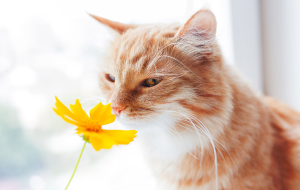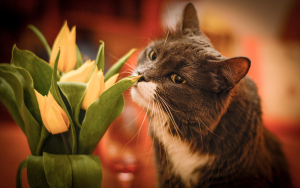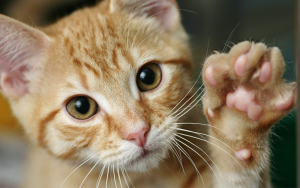Why Do Cats Hiss? Understanding the Mystery Behind This Common Feline Behavior

Cats are fascinating creatures, beloved for their playful antics and enigmatic personalities. Among their many vocalizations, the hiss stands out as one of the most dramatic and universally recognized. But why do cats hiss? Is it always a sign of aggression?
Or could it mean something more subtle? In this article, we’ll delve into the reasons behind this behavior, providing insight into feline communication while adhering to best SEO practices.
What Is a Cat Hiss?
A hiss is a sharp, forceful sound that cats produce by expelling air through their mouths, often accompanied by an arched back, puffed fur, and bared teeth. This defensive display is a clear warning signal in the feline world, meant to communicate discomfort,
fear, or threat.
While hissing may seem intimidating, it’s not always a sign of hostility. Instead, it’s a nuanced form of communication with various potential meanings.
The Science Behind Cat Hissing
Cats are highly territorial and sensitive animals. Their hissing is a natural response to situations where they feel cornered, threatened, or anxious. Here are some of the most common reasons why cats hiss:
1. Fear or Anxiety
One of the primary reasons a cat hisses is fear. When faced with an unfamiliar person, animal, or environment, cats may hiss as a way to signal their discomfort. This behavior serves as a defense mechanism, warning the perceived threat to stay away.
Examples of fear-induced hissing:
- Encountering a new pet in the household.
- Hearing loud or unexpected noises.
- Being approached too quickly or aggressively by a stranger.
2. Territorial Disputes
Cats are naturally territorial animals. They hiss when they perceive an invasion of their personal space, whether by another cat, a dog, or even a human. This behavior is particularly common during introductions between pets or when outdoor cats encounter
each other.
Key signs:
- Hissing accompanied by growling and puffed fur.
- Standing ground rather than retreating.
3. Pain or Illness
If a normally friendly cat starts hissing unexpectedly, it could indicate pain or an underlying medical condition. Cats are masters at hiding discomfort, so hissing might be their way of expressing physical distress.
Common causes of pain-induced hissing:
- Arthritis or joint pain.
- Dental problems like tooth decay or abscesses.
- Injuries, such as cuts or bruises.
4. Overstimulation
Cats have specific thresholds for physical interaction. Prolonged petting, especially in sensitive areas like the belly or tail, can lead to overstimulation. When this happens, a hiss serves as a polite (or not-so-polite) way of saying, “Enough!”
5. Protecting Kittens
Mother cats, or queens, are fiercely protective of their young. Hissing is a common behavior among nursing mothers to ward off potential threats. This defensive display ensures their kittens stay safe from harm.
6. Past Trauma or Poor Socialization
Cats with a history of abuse or neglect may hiss more frequently due to heightened anxiety. Similarly, cats that were not properly socialized as kittens may feel uneasy in new situations, leading to increased hissing.
Decoding Cat Hissing: Body Language Matters
To fully understand why your cat is hissing, pay attention to their body language. A hiss rarely occurs in isolation and is often accompanied by other physical cues:
- Ears flattened: Indicates fear or aggression.
- Arched back: A defensive posture to appear larger.
- Puffed tail: A sign of heightened anxiety or alarm.
- Dilated pupils: Suggests heightened alertness or stress.
Understanding these signals can help you interpret your cat’s emotions more effectively and respond appropriately.
How to Respond When Your Cat Hisses
If your cat hisses, it’s crucial to remain calm and avoid escalating the situation. Here’s a step-by-step guide to handling this behavior:
1. Give Them Space
A hissing cat is asking for distance. Respect their boundaries and give them time to calm down.
2. Identify the Trigger
Try to determine what caused the hissing. Was it an unfamiliar visitor? Another pet? Overstimulation? Once you identify the trigger, you can work to eliminate or manage it.
3. Don’t Punish the Cat
Punishing a cat for hissing can worsen their fear or anxiety. Instead, focus on creating a safe and stress-free environment.
4. Offer Reassurance
Speak in a soft, soothing tone to help your cat feel safe. Avoid making sudden movements or loud noises.
5. Use Positive Reinforcement
Reward calm behavior with treats, toys, or gentle petting. This helps reinforce the idea that they don’t need to hiss to feel secure.
6. Consult a Veterinarian if Necessary
If your cat’s hissing becomes frequent or is accompanied by other unusual behaviors, it’s a good idea to consult a veterinarian to rule out medical issues.
How to Prevent Cat Hissing
While some hissing is unavoidable, there are steps you can take to minimize it:
-
Gradual Introductions
When introducing a new pet or person, do so slowly. Allow your cat to observe from a distance and approach at their own pace. -
Enrich Their Environment
Provide plenty of toys, scratching posts, and hiding spots to keep your cat mentally and physically stimulated. -
Respect Personal Space
Cats value their independence. Avoid forcing interactions, especially when they’re eating, sleeping, or hiding. -
Socialize Early
Kittens exposed to a variety of people, animals, and environments early in life are less likely to develop fear-based hissing behaviors as adults. -
Monitor Health
Regular veterinary check-ups can help catch potential health issues before they lead to behavioral changes.
The Positive Side of Hissing
Although hissing may seem like negative behavior, it’s a vital part of feline communication. By hissing, cats set boundaries, express their emotions, and protect themselves. As responsible pet owners, it’s our job to listen to and respect these signals.
Final Thoughts
Understanding why cats hiss is key to building a stronger bond with your feline companion. By learning to interpret their body language and responding with empathy, you can create a safe and harmonious environment for your pet.
Whether it’s fear, territoriality, or simply a way of saying, “Back off,” a hiss is a window into your cat’s world—a world full of complex emotions and unique needs.
If your cat’s hissing persists or escalates, don’t hesitate to seek advice from a veterinarian or animal behaviorist. With patience and understanding, you can help your cat feel safe, loved, and at ease.







